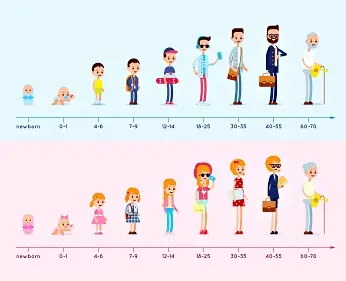Puberty

Puberty refers to the changes that children undergo as they develop into adults.
Hormones called androgens trigger hair development from tiny fine vellus hair to thicker, darker, deeper-rooted terminal hairs.
These are usually found on the scalp, underarms, pubis and legs
https://111.wales.nhs.uk/puberty
The physical changes of puberty include:
Growth spurt:
A rapid increase in height and weight.
Development of sex organs:
The testicles in boys and the ovaries in girls begin producing hormones that cause the reproductive organs to develop.
Development of secondary sex characteristics:
Certain physical features distinguish males from females, generally breasts in girls and facial hair in boys.
Menstruation:
Girls will begin their menstrual cycle, which is the monthly shedding of the uterus lining.
Emotional changes start to take place, including:
Heightened emotions:
Teens may experience a wider range of emotions, including happiness, sadness, anger, and confusion.
Self-image consciousness:
Teens may become more aware of their bodies and how they look, and they may start to compare themselves to others.
Puberty is a normal, healthy part of becoming an adult. Understanding the physical and emotional changes during puberty enables teens to cope with the process.
Dealing with so much upheaval can be overwhelming, and it’s easy to worry that certain aspects may not be normal.
Children do not always start puberty at the same time and rate as their friends, which adds to their anxiety—they need good communication with trusted adults who can explain the facts and give reassurance.
Author: Sharon Birchall MBIAE June 2023
